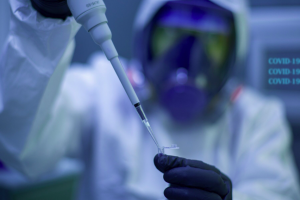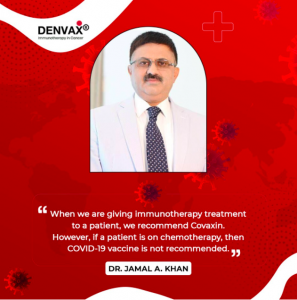
American researchers say COVID-19 vaccine can benefit cancer patients; Indian medical experts think more data is needed
Indian medical experts think that data is needed in the Indian setting to verify findings of the American research.
NEW DELHI, INDIA, February 11, 2022 /EINPresswire.com/ -- A group of American researchers have said that cancer patients can benefit from COVID-19 vaccination. In a study that was published in the Journal of the National Comprehensive Cancer Network (JNCCN), the researchers concluded that mRNA vaccination is as safe for cancer patients as for cancer-free individuals; besides, this vaccine can even benefit cancer patients.Responding to this, Indian medical experts have said that more data is needed, specially in the Indian setting of cancer patients and healthy individuals, to verify this finding.
Ever since COVID-19 vaccination was introduced last year, cancer patients worldwide have grappled with the question of whether they should be taking the vaccine or not. As cancer negatively affects the immune system, cancer patients are more likely to get infected by COVID-19 than cancer-free individuals; however, they do not find it safe to take a vaccine until and unless research provides concluding evidence that such vaccines are indeed safe for cancer patients.
It is in this context that the American research came as a relief. That said, it should be kept in mind that the research was conducted by administering two doses of the Pfizer-BioNTech mRNA vaccine, separated by approximately three weeks, to the study participants.
Compared to the American context, a number of factors are different in the Indian setting, predominantly the fact that most Indians have taken Covishield and Covaxin vaccines against COVID-19.
“More data is needed to verify the findings revealed by American researchers. And, we need to have data in the Indian setting, as the vaccines are different. What works for them (Western population) may or may not work for Indian population. So, more data is needed at this point,” said Dr. Sharmin Yaqin, co-founder, Denvax.
“When we are giving immunotherapy treatment to a patient, we recommend Covaxin. However, if a patient is on chemotherapy, then COVID-19 vaccine is not recommended. This is because it’s a viral vaccine and an RNA-based vaccine, and chemotherapy reduces immune responses to a considerable extent. So, usually, oncologists don’t recommend COVID-19 vaccine if a patient is getting chemotherapy treatment,” said Dr. Jamal A. Khan, co-founder, Denvax.
Dr. Khan and Dr. Yaqin are leading immunotherapists in India, who have pioneered the concept of customised cancer treatment and cancer immunotherapy through Denvax clinics.
Dr. Yaqin hit the nail on the head, as even the JNCCN study noted, “It is also important to note that our study population received only the mRNA Pfizer BNT162b2 vaccine. The alarm raised by the COVID-19 pandemic has prompted the development of numerous vaccine candidates, requiring a variety of delivery strategies—including >180 vaccines still under clinical investigation.”
Therefore, it is clear that the findings of this study are relevant to its participants, who were administered a different vaccine than that taken by most people in India. That being said, the study by American researchers can still be called significant research in the field of “COVID-19 and cancer patients.”
During the study, the respondents were given two doses of the Pfizer BNT162b2 vaccine, which were three weeks apart. Then, a survey was conducted to report the adverse reactions to the dose 1 of the vaccine and later even to the dose 2 of the vaccine.
Further, the researchers included other data points about the participants related to their age, race, ethnicity, history of cancer, and recent or ongoing cancer treatment, which include surgery, radiation, chemotherapy, immunotherapy, targeted therapy, and hormone therapy.
The participants were asked to report symptoms, like tiredness, local pain or swelling at the site of injection, muscle and joint pain, fever, chills, headache, etc. The study showed that “mRNA COVID-19 vaccine is well tolerated by patients with a history of cancer, including those receiving active treatment.”
It concluded by saying that, “Widespread dissemination of results such as those reported in this study will ensure that a safe and effective COVID-19 vaccine—justly celebrated as a scientific and medical triumph—is provided to the patients, including those with cancer, who stand to benefit from it most.”
The fact that such an exhaustive set of data points were gathered and analysed shows that the study’s findings are robust. If similar studies are conducted in India, then the Indian medical fraternity will be able to say with confidence whether COVID-19 vaccine should be given to cancer patients.
There still is a considerable amount of ambiguity in terms of the relationship between COVID-19 and cancer. Cancer patients are concerned with a number of factors; for example, the impact of cancer on the mortality rate of cancer patients, whether cancer patients are more likely to develop a serious illness due to COVID-19, whether cancer screenings should be done amidst a COVID-19 wave, etc.
Moreover, cancer is a complex disease, as no two cancer patients are alike. Several factors play a role in assessing criticality of a case, including age of a patient, ethnicity, stage of cancer, type of cancer (lung, breast, mouth, liver, etc.), grade of cancer, a patient’s immune condition, the environment in a house, and the quality of care given by doctors.
As such factors are certainly different for patients in India compared to those in the U.S., it is important for such studies to happen in the Indian context, as suggested by Dr. Yaqin from Denvax.
+++++++++++++++++++++++++++++++
About Denvax:
Founded by Dr. Jamal A. Khan and Dr. Sharmin Yaqin, Denvax is a chain of clinics, which provide customized dendritic cell-based cancer immunotherapy. Dr. Khan and Dr. Yaqin have revolutionized cancer treatment by using immunotherapy with the help of cancer-fighting dendritic cells.
In India, Denvax has has clinics in Mumbai, Delhi, Hyderabad, Kolkata, Chennai, Amritsar, Ahmedabad, and Lucknow.
Mr. Nadeem
Denvax
+91 93118 08420
email us here
Visit us on social media:
Facebook
Twitter
LinkedIn
Other
Distribution channels: Business & Economy, Companies, Healthcare & Pharmaceuticals Industry, Insurance Industry, World & Regional
Legal Disclaimer:
EIN Presswire provides this news content "as is" without warranty of any kind. We do not accept any responsibility or liability for the accuracy, content, images, videos, licenses, completeness, legality, or reliability of the information contained in this article. If you have any complaints or copyright issues related to this article, kindly contact the author above.
Submit your press release


